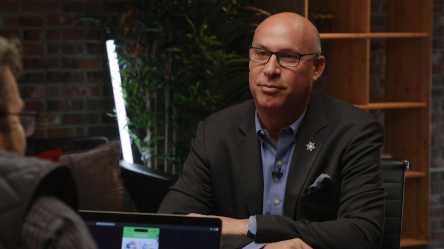GAF trains IT staffers in people skills and sends them to the field to collaborate with clients.
It’s pretty standard these days for companies to place their technology on the front lines as they battle for position in the knowledge economy.
What’s not so common is for a decidedly traditional business like GAF, which is North America’s largest manufacturer of roofing materials, to use not just IT but also technology talent for competitive differentiation.
For more than a year, GAF technology professionals have joined CIO Adam Noble in two- and three-day collaborative brainstorming sessions with customers — roofing distributors and contractors. The idea stems from Noble’s own annual meetings with business leaders from GAF’s largest customers to discuss strategic IT, industry trends, business goals and ideas for making it easier to do business with the $3 billion company.
The meetings “foster collaboration, communication and shared success,” Noble says. “If they want to do something in an area like security or mobile, we can provide a point of reference or insight they may not have.”
Not only is GAF offering a service that’s atypical for a roofing company, lifting itself above the status of a simple commodity product provider, it’s also closing a well-known skills gap.
In a 2013 survey by Adecco Staffing U.S., 44 percent of 500 senior executives said the biggest skills gap they faced was the soft-skills combination of communication, critical thinking, creativity and collaboration, which was a far bigger concern than technical skills (22 percent), leadership (14 percent) and computer skills (12 percent).
Connecting IT staff and customers requires both formal and informal training in what Noble identifies as 10 core skills. These include communicating effectively and calibrating the granularity of presentations to the intended audience. Developing these skills is now included in IT employee performance goals.
So far, only senior and mid-level IT professionals have participated in these client brainstorming sessions, at which Noble acts as facilitator, and about 10 percent of the staff has attended a meeting so far. But Noble ultimately wants to include anyone who is ready and willing, which is why he initiated a formal training program for managers and informal training for all IT staff members, even people who may never meet a customer.
“I want to get to the point where there isn’t anyone in the organization who, if I tapped them on the shoulder, they couldn’t go do this,” Noble says.
Dan Roberts, president and CEO of Ouellette and Associates Consulting, agrees that business and communications skills are important for all IT roles, “whether you aspire to management or wish to be the most effective individual contributor you can be.”
Ideally, Roberts says, companies should give IT professionals the tools they need to independently navigate their professional growth and hold them accountable for these skills.
For GAF, involving IT in customer meetings is now a key talent-management tool and an aid to employee engagement, Noble says. That’s important in today’s tight market for tech talent, particularly for manufacturers, which rank among the bottom three industries in terms of employee engagement, according to a 2013 study by consultancy Quantum Workplace.
“They’re hearing directly from the customer on goals they want to pursue, and they’re able to help drive initiatives that make it easier to do business with GAF,” Noble says. “They’re doing what they love to do–working in technology–and they’re able to do something that really impacts both our and the customer’s business.”
Follow everything from CIO.com on Twitter @CIOonline, Facebook, Google + and LinkedIn.








